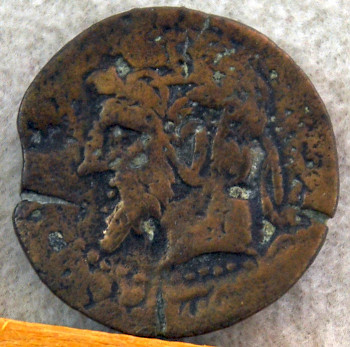Massinissa
Massinissa (c.241-148): king of the Massylians in Numidia (202-148).

When Massinissa was born, Numidia (more or less the north of modern Algeria) was a country on the edge of the urbanized world of the Mediterranean. Although many people were living in large villages that would eventually develop into cities, another part of the Numidian population was still roaming over the plains. Our word "nomad" is derived from "Numidia".
There were two tribal federations, both in the process of becoming full-blown kingdoms. In the west lived the Masaeisylians, in the east the Massylians. (They are already confused in ancient sources.) It seems that the eastern kingdom, which was close to Carthage, was more sympathetic to this city, and it is possible that the Carthaginians had actively encouraged the rise of a pro-Carthaginian dynasty that would be a buffer against the western Numidians.
Massinissa was the son of king Gala (or Gaïa) of the Massylians, and was educated in Carthage - a kind way to say that he was in fact a hostage. In 212, when he was almost thirty years old, he served as commander of a Numidian cavalry unit in the Carthaginian army in Iberia. These were the years of the Second Punic War (218-202), in which Hannibal was fighting in Italy against the Romans. At the same time, the Romans tried to conquer Hispania, which was defended by Hannibal's brother Hasdrubal. In 211, he defeated and killed the two Roman commanders Publius and Gnaeus Cornelius Scipio, near Castulo.
However, the Romans were able to reorganize their army, which was commanded by Publius Cornelius Scipio, the son of the man who had been defeated by Hasdrubal. In 209, Scipio captured Carthago Nova, the Carthaginian capital in Iberia, and Massinissa is recorded to have been active in this area in the following year. By this time, Hasdrubal was trying to bring reinforcements to his brother in Italy (in vain), and the Carthaginian army, under new leaders, was slowly forced back to Andalusia. In 206, they were decisively defeated near Ilipa, and Scipio proceeded to capture the last Carthaginian strongholds.
At this moment, Massinissa must have understood that Rome was to win the war. He negotiated with his opponents, and both parties agrees that if the Romans would invade Africa, Massinissa would help them. The Massylian prince had good reasons to conclude this deal, because in the meantime, his father had died, and the kingdom had been taken over by his brother Oezalces. The Romans could help Massinissa become king.
Unfortunately, Rome did not strike immediately. Scipio was first sent to Sicily, from where he first had to reconquer the "toe" of Italy to secure the Strait of Messina. Meanwhile, the two competing Massylian factions were easy victims for another enemy, king Syphax of the Masaeisylians. Massinissa was still able to assist a first Roman expedition to Africa, commanded by Scipio's deputy Laelius - together they looted the camp of Syphax - but in the end, Massinissa lost his position, and when Scipio finally made his appearance in Africa in 203, the Numidian could offer only 200 cavalry.
Yet, now that the Romans were there, he was able to recover his ground. In the battle on the great plains, Syphax and the Carthaginian commander Hasdrubal, son of Gesco, were defeated, and while the Roman general concentrated on Carthage, Massinissa followed Syphax to Cirta, where he took him prisoner.
Among the captives was also Syphax's wife Sophonisba (daughter of Hasdrubal), with whom Massinissa had once been engaged. He now married her, and when Scipio showed interest in this woman, who was a fierce Carthaginian patriot, Massinissa decided to poison her.
In the meantime, Hannibal had arrived on the scene, but on 19 October 202, Scipio defeated the Carthaginian general near Zama. Massinissa's cavalry played an important role in this battle. Almost immediately, Carthage surrendered. Massinissa was rewarded with the throne of all Numidia. His reign was to last more than half a century.
In this period, he developed the country economically. Cities multiplied and continued to grow, trade benefited, agriculture was intensified. Thugga became a new royal residence.
In 179, Numidia produced a surplus, and Massinissa could present himself as the benefactor of the Greek island of Delos, which gave him credentials in the Greek-Roman world as leader of a civilized nation. In the company of Scipio and his relatives, Massinissa also met the Greek historian Polybius of Megalopolis, who seems to have liked the Numidian king and describes him as a cultivated man, whose mission it was to civilize his country. The positive tone of our sources is essentially based on Polybius' portrait.
As an ally of Rome living near its arch-enemy, Massinissa could always raid Carthaginian land, or simply claim that it was his. Rome would always help him (e.g., in 193, 182, 174, 172). So he gained ports in the north and east (e.g., Sabratha, Oea [in 162/161], and Lepcis Magna).
In 154, Carthage decided to strike back, and began to build an army. Immediately, the Romans, who learned from it from an envoy of Massinissa, investigated the case, and they tried to strike a compromise. But Massinissa's raids continued, and in 151, the Carthaginians declared war upon the Numidians. The king, who was now ninety-two years old, defeated his enemies, who were commanded by Hasdrubal. Carthage now also incurred a war against the Romans. In 146, the city was sacked.
Massinissa died in 148, shortly after the Roman invasion. The Roman historian Livy records that he had been "so vigorous that among the other youthful exploits that he performed during his final years, he was still sexually active and begot a son when he was eighty-six".note He left his kingdom to his three sons Micipsa, Gulussa, and Mastanabal.note
King Jugurtha, who was to be a famous enemy of Rome by the end of the second century, was a son of Mastanabal..